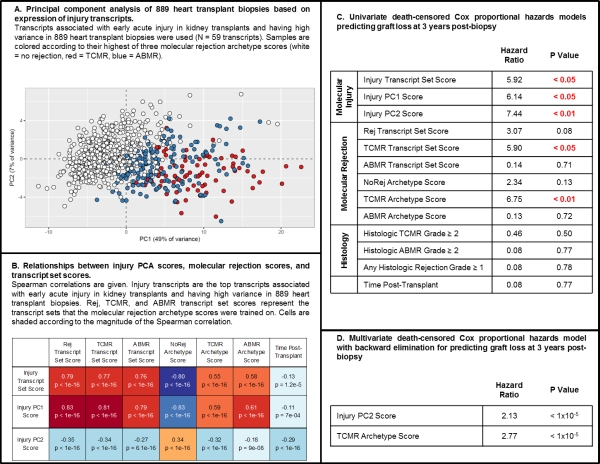T Cell-Mediated Rejection Poses Greater Risk to Graft Survival Than Antibody-Mediated Rejection in Heart Transplants
University of Alberta, Edmonton, Canada.
Meeting: 2018 American Transplant Congress
Abstract number: 170
Keywords: Gene expression, Graft survival, Heart, Multicenter studies
Session Information
Session Name: Concurrent Session: The Guest That NEVER Leaves: Immunologic Challenges in Heart Transplantation
Session Type: Concurrent Session
Date: Sunday, June 3, 2018
Session Time: 4:30pm-6:00pm
 Presentation Time: 5:18pm-5:30pm
Presentation Time: 5:18pm-5:30pm
Location: Room 4C-3
Purpose: In kidney transplants, failure post-biopsy is associated with acute injury transcript expression reflecting the histologically silent tissue response-to-wounding (JCI 120:1862) and antibody-mediated rejection (ABMR), but T cell-mediated rejection (TCMR) has little impact (AJT 9:2520). We studied heart transplants to determine the relationship between injury, TCMR, ABMR, and graft failure after endomyocardial biopsy (EMB).
Methods: 889 single EMB bites from 462 recipients were analyzed using Affymetrix microarrays. We assigned molecular rejection (non-rejection, TCMR, and ABMR) scores by archetypal analysis trained on all-rejection, TCMR, and ABMR-associated transcripts (JHLT 36:1192). In addition, we assessed EMB injury phenotypes by expression of transcripts defined in acute kidney injury and expressed with high variance in hearts. Survival analyses used one random biopsy per patient.
Results: To assess heart injury, we performed principal component analysis (PCA) on EMB using expression of injury transcripts (originally derived in kidney), and compared the distribution by injury PCA to their molecular rejection phenotypes (colors) (Figure 1A). PC1 scores most directly reflected expression of injury transcripts and correlated strongly with molecular rejection; PC2 scores distinguished an element of injury independent of rejection (Figure 1B). In univariate analyses of survival 3 years post-biopsy (Figure 1C) features of molecular injury and molecular TCMR predicted failure whereas histologic TCMR or ABMR did not. Surprisingly, molecular TCMR posed a greater hazard than ABMR. In multivariate analysis (Figure 1D) injury PC2 and molecular TCMR scores were the only significant hazards to graft loss.
Conclusion: In heart transplants molecular injury is strongly associated with rejection, and, as in kidney transplants, molecular injury predicts future failure. Unlike kidneys, graft loss within 3 years post-biopsy is associated with TCMR but not ABMR. These results raise the possibility that heart TCMR elicits a more aggressive, deleterious injury response than kidneys, or that ABMR is better tolerated in hearts than in kidneys. ClinicalTrials.gov #NCT02670408.
CITATION INFORMATION: Parkes M., Famulski K., Halloran P., The INTERHEART Study Group T Cell-Mediated Rejection Poses Greater Risk to Graft Survival Than Antibody-Mediated Rejection in Heart Transplants Am J Transplant. 2017;17 (suppl 3).
To cite this abstract in AMA style:
Parkes M, Famulski K, Halloran P, Group TheINTERHEARTStudy. T Cell-Mediated Rejection Poses Greater Risk to Graft Survival Than Antibody-Mediated Rejection in Heart Transplants [abstract]. https://atcmeetingabstracts.com/abstract/t-cell-mediated-rejection-poses-greater-risk-to-graft-survival-than-antibody-mediated-rejection-in-heart-transplants/. Accessed February 19, 2026.« Back to 2018 American Transplant Congress

